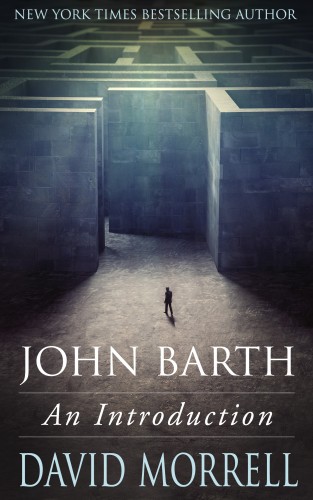John Barth: An Introduction
 Title: John Barth: An Introduction
Title: John Barth: An IntroductionSeries: Non-Fiction
Buy the Book: Amazon, Barnes & Noble, Smashwords, Kobo, Google Play
Synopsis
In 1969, while David was writing First Blood, the novel in which Rambo was created, he also wrote his doctoral dissertation about acclaimed author, John Barth. In it, David analyses Barth’s early fiction, using interviews with Barth, his agent, and his editors as well as Barth’s unpublished essays and letters to tell what David calls “the story behind the stories, a biography of Barth’s fiction.” Over the years, scholars have found John Barth: An Introduction invaluable for its lengthy biographical sections, which Barth himself approved. Fans of David’s fiction will find this book enlightening in terms of what Barth taught him about writing, particularly the idea that the way a novel is written should have something to do with its theme, that form and content should go together.
Backstory
My writing career would never have happened if I hadn’t read Philip Young’s book, Ernest Hemingway. At the time, I was an undergraduate in a small college in southern Ontario, Canada. I was so impressed by Young’s book that I moved to the United States to study with him at Penn State. There, I met another Philip–Philip Klass, a professional author with the pen name of William Tenn–who taught me how to write fiction. But that’s another story. What matters here is that Young became my academic advisor and suggested that I write my Ph. D. dissertation on acclaimed author John Barth, who was Young’s friend. Barth agreed to be interviewed, allowed me to examine his research materials, and even fact-checked my book’s biographical sections. It’s an unusual dissertation and was considered to be controversial, because I wrote it as a narrative–as a story about Barth’s stories. The Penn State Press published it in 1976. Eventually John Barth: An Introduction went out of print. But through the magic of e-books, it’s now available again. I revised the text and took a lot of the Ph.D. out of it. Readers who enjoy my work will find this book informative in terms of what I learned from Barth about writing.
For more information about my debt to Philip Young, read my introduction to a collection of Young’s brilliant essays that I co-edited with Sandra Spanier: American Fiction, American Myth.
Critical reaction
“David Morrell’s not just a fine writer; he’s also a great and generous teacher.”
—New York Times bestselling author Lawrence Block
“Morrell has written an interesting and informative book which reads occasionally like a biography. His prose is eminently clear and straightforward. His book has something for everyone. There is no doubt that it will become a necessity for serious students of Barth, and that, coincidentally, it is a genuinely interesting book.”
—Journal of Modern Literature
“Morrell’s study tells the story of Barth’s storytelling, how he got his ideas, and then how the publishers and reviewers dealt with them. He includes detailed biographical information [and] writes with great economy and clarity.”
—Modern Fiction Studies
“Morrell gives the reader the benefit of his familiarity with Barth and his manuscripts to plot the career of each work, from plans and, in some cases, research through revision, publisher-agent reactions, sales, and post-publication revisions. The whole enterprise is carried off with appealing confidence and informality that add up to an eminently readable book.”
—World Literature Today